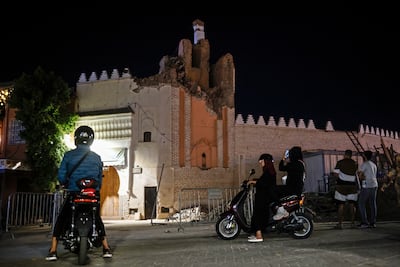Follow the latest updates on the Morocco earthquake
Damages arising from the deadly earthquake that hit Morocco on Friday could be as high as 8 per cent of the country's gross domestic product, according to the latest estimates from the United States Geological Survey.
That would be about $10.7 billion, based on the North African country's 2022 GDP estimate of $134.18 billion, according to data from the World Bank.
The USGS, releasing its estimates through its Prompt Assessment of Global Earthquakes for Response (Pager) system, assigned a red alert warning for potential economic losses faced by Morocco.
“Extensive damage is probable, and the disaster is likely [to be] widespread. Estimated economic losses are 0 to 2 per cent GDP of Morocco. Past events with this alert level have required a national or international level response,” the Virginia-based agency said.
Pager is an automated system that assesses earthquake impacts by comparing the population exposed to each level of shaking intensity with models of economic and fatality losses based on earthquakes in each country or region, according to its website.
Strong earthquakes pose a major problem for an economy, as it would most certainly cripple activity and incur reconstruction costs.
The earthquake that struck Turkey and Syria in February caused an estimated $5.1 billion in direct physical damages in Syria alone, a World Bank report said.
In Turkey, economic losses were estimated to exceed $25 billion, with the road to recovery expected to take several years, Moody’s RMS said.
The estimated cost of reconstruction following the 7.8-magnitude tremor on February 6, which killed more than 50,000 people, is more than $100 billion, the UN said.
The Turkey-Syria earthquake was the fifth biggest in terms of economic impact, ranking behind those that happened in California (1994, $44 billion), Sichuan in China (2008, $85 billion), Hyogo in Japan (1995, $100 billion) and Tohoku in Japan (2011, $210 billion), according to data from Statista.
The epicentre of Morocco's magnitude-6.8 quake was at a depth of 18.5km and occurred in the country's Atlas Mountains, about 72km south-west of Marrakesh at just after 11pm local time, according to the USGS.

It has killed more than 2,000 people, according to the country’s Interior Ministry. The deaths were in Marrakesh and in areas to the south.
Morocco's last major tremor, in 2004, killed 628 people and destroyed 12,000 homes.
The risk of earthquakes affects two areas of the country: the north, a hub of economic activity, and the Agadir Region, one of Morocco’s main tourism centres, according to the Organisation for Economic Co-operation and Development.
In a joint statement on Sunday, the International Monetary Fund, the World Bank, the European Commission, France, India, and the African Union said they would “support Morocco in the best possible way.”
“We have been and continue to be committed partners of Morocco, supporting the authorities as they have built an inclusive and resilient economy with strong institutions,” they said.
“This strength will serve the Moroccan people well as they recover from the devastation of the earthquake.”
The group said they would “provide all the necessary support for any urgent short-term financial needs and for the reconstruction efforts,” in the North African country.
“To this end, we will mobilise our technical and financial tools and assistance in a co-ordinated way to help the people of Morocco overcome this terrible tragedy”.
Morocco's economy has already contracted because of domestic and international shocks including a drought and high commodity prices, according to the World Bank.
Morocco's real gross domestic product growth plummeted to an estimated 1.2 per cent between 2021 and 2022 from 7.9 per cent “pushing core inflation to 8.5 per cent in February 2023 and disproportionately affecting poorer households,” the World Bank said in May.
The authorities have initiated new measures including untargeted subsidies, regulated prices and a moderate monetary tightening to control inflation but it has put “significant pressure on public finances”, it said.
Morocco is also a major tourist spot with Marrakesh being home to many Unesco world heritage sites. So far, it is not known to what extent tourism will be impacted as a result of the earthquake.
Tourism represents 7 per cent of Moroccan economic activity, employing more than half a million people, according to Mordor Intelligence.

